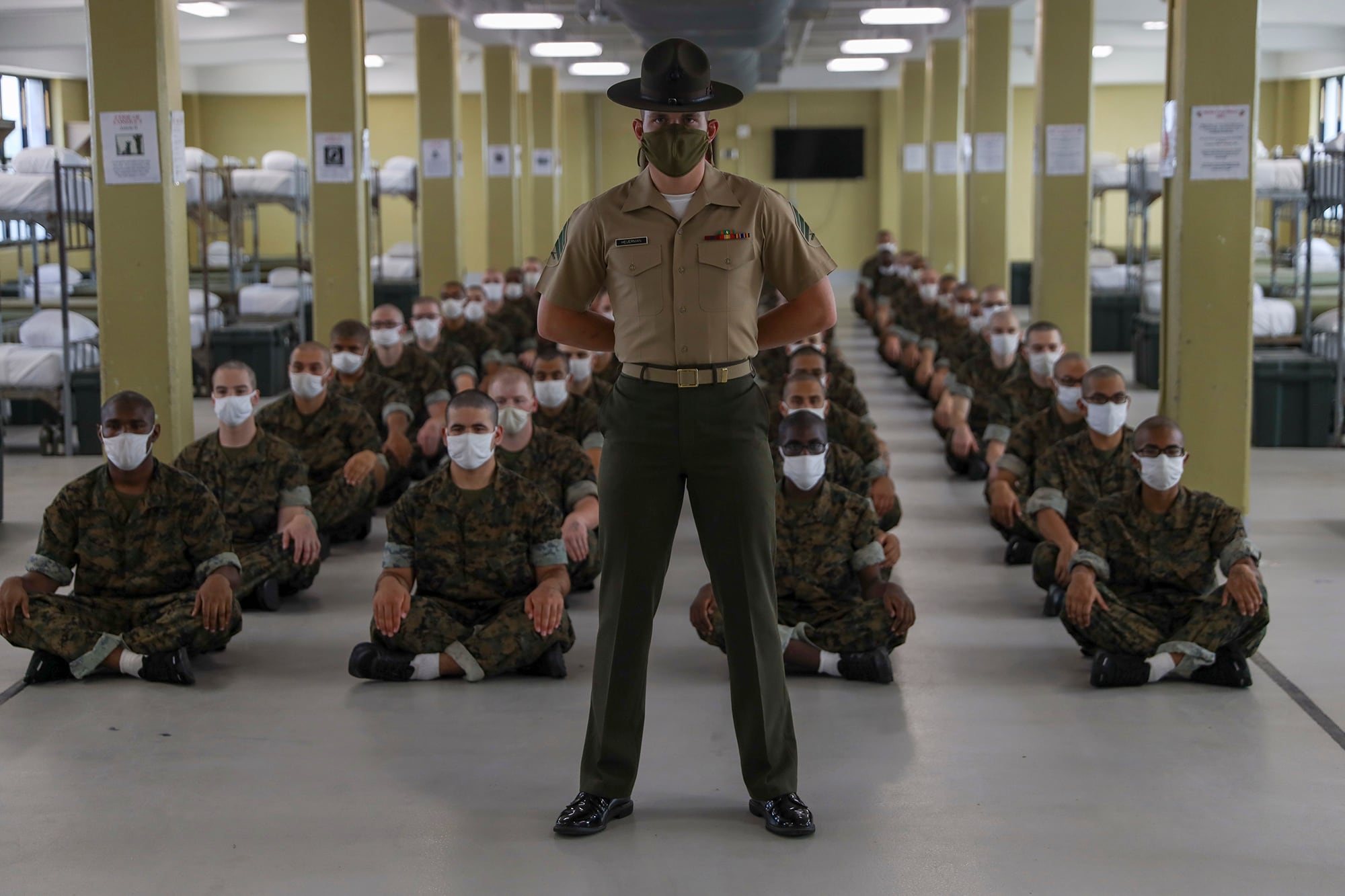Have you had COVID? Think you’re immune from it in the future? Think again, according to the results of a new study of Marine Corps recruits.
Ten percent of the recruits whose blood tested positive for COVID-19 antibodies before training were re-infected with COVID while in basic training at Marine Corps Recruit Depot Parris Island, South Carolina.
The findings make a strong argument for healthy young Americans to get vaccinated, according to researchers.
“For our particular population, this is very strong data about why individuals previously infected, regardless of whether they had symptoms or not, should get the vaccine in accordance with DoD policy,” said Navy Cmdr. Andrew Letizia, deputy director of the infectious disease directorate at the Naval Medical Research Center. The doctor is one of the researchers and authors of the study, published in the Lancet Respiratory Medicine Journal Thursday.
Antibodies are proteins made by the immune system to fight infections; it’s uncertain whether young adults who get COVID are at risk of getting it again. NMRC conducted the study along with the Icahn School of Medicine at Mount Sinai to examine how effective antibodies are in preventing future COVID infections.
Recruits with these COVID-19 antibodies had about one-fifth the risk of getting COVID again, compared with those who didn’t have antibodies. While antibodies from previous COVID-19 infection do provide some protection to young adults, it’s no guarantee, the authors stated.
This is the largest study of COVID-19 looking over the long-term, where researchers have followed active-duty members before they got infected, Letizia said. They used data from blood samples and nasal swabs collected from the recruits when they arrived at Parris Island, and over six weeks of observation after they left their two weeks of restriction of movement.
The findings have implications for readiness, Letizia said. “Young, healthy Americans, regardless of whether they’ve been previously infected or not, should pursue getting a vaccine. That’s going to be the best thing they can do when it comes to long-term medical readiness for themselves and for their units.
“That’s the key crux of all of this when it comes to readiness.”
During the study, which was conducted between May and November, 10 percent of the 189 recruits who had COVID-19 antibodies were re-infected. And 48 percent — 1,079 — of the 2,247 Marine recruits in the study who had not been previously infected with COVID-19 got COVID while they were in basic training.
Those who got COVID “had universally good outcomes,” Letizia said, and the majority didn’t even know they were infected, or re-infected, until they were told about the test results.
“The Marines were certainly doing a fantastic job of observing these public health mitigation strategies,” Letizia said. But the high infection rate of 48 percent “shows us how incredibly infectious this virus can be in this particular setting,” he said. Contributing factors include the type of training that requires close contact and grappling and physical engagement, he said, and the immune system can become more run down. Researchers noted that COVID infections might have been introduced by permanent staff members who interacted with the recruits.
“It’s a very unique environment, but certainly shows the potential of how infectious SARS-CoV-2 can be,” Letizia said.
“This is not an aspect of our study that’s very generalizable to the civilian population at all, because basic training is a very different setting than our normal day-to-day lives,” Letizia said, noting that he suspects that there are lot of other young healthy Americans who have gotten infected and don’t know it.
RELATED

Before they proceeded to basic training, every recruit in this portion of the study had three negative COVID tests, Letizia said. “We can very confidently say that any infections the recruits got during the six weeks of intense observation were in basic training, as opposed to ROM, and was due to a new infection and not a residual infection.”
Researchers looked at the level of antibodies, and how well the antibodies could neutralize the virus and protect the body. In the Marine recruits who had COVID antibodies but were re-infected, researchers found there were lower levels of those neutralizing antibodies, Letizia said.
Marine recruits were given the opportunity to volunteer for the study, which is part of ongoing research beginning in May 2020 with the Navy and Marine Corps working to make sure military training could safely continue during the pandemic. The next phase of the research is following up with the newly minted Marines at their current duty locations around the world, to look at the duration and effectiveness of the immune response, whether it’s from the natural immunity or by way of the vaccination. They’re also looking at long-term medical effects of those in this young, healthy population who have been infected by COVID-19, Letizia said.
Karen has covered military families, quality of life and consumer issues for Military Times for more than 30 years, and is co-author of a chapter on media coverage of military families in the book "A Battle Plan for Supporting Military Families." She previously worked for newspapers in Guam, Norfolk, Jacksonville, Fla., and Athens, Ga.



